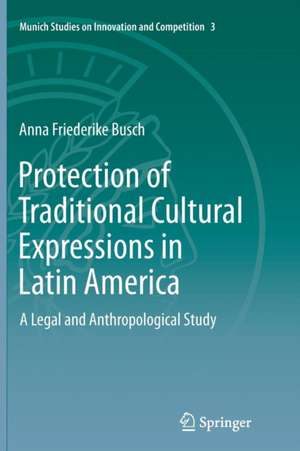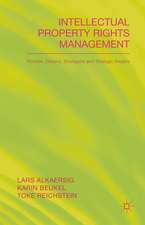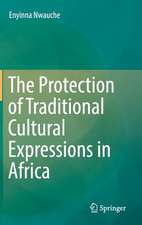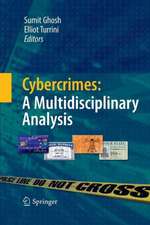Protection of Traditional Cultural Expressions in Latin America: A Legal and Anthropological Study: Munich Studies on Innovation and Competition, cartea 3
Autor Anna Friederike Buschen Limba Engleză Paperback – 29 oct 2016
| Toate formatele și edițiile | Preț | Express |
|---|---|---|
| Paperback (1) | 649.39 lei 6-8 săpt. | |
| Springer Berlin, Heidelberg – 29 oct 2016 | 649.39 lei 6-8 săpt. | |
| Hardback (1) | 655.78 lei 6-8 săpt. | |
| Springer Berlin, Heidelberg – 2 iun 2015 | 655.78 lei 6-8 săpt. |
Din seria Munich Studies on Innovation and Competition
- 15%
 Preț: 644.63 lei
Preț: 644.63 lei - 15%
 Preț: 587.20 lei
Preț: 587.20 lei - 15%
 Preț: 528.30 lei
Preț: 528.30 lei - 18%
 Preț: 952.09 lei
Preț: 952.09 lei - 15%
 Preț: 654.43 lei
Preț: 654.43 lei - 18%
 Preț: 724.63 lei
Preț: 724.63 lei - 18%
 Preț: 1007.49 lei
Preț: 1007.49 lei - 18%
 Preț: 782.24 lei
Preț: 782.24 lei - 18%
 Preț: 894.65 lei
Preț: 894.65 lei - 18%
 Preț: 786.04 lei
Preț: 786.04 lei - 24%
 Preț: 828.05 lei
Preț: 828.05 lei - 15%
 Preț: 652.64 lei
Preț: 652.64 lei -
 Preț: 430.97 lei
Preț: 430.97 lei - 15%
 Preț: 655.78 lei
Preț: 655.78 lei - 15%
 Preț: 645.47 lei
Preț: 645.47 lei - 20%
 Preț: 576.88 lei
Preț: 576.88 lei - 15%
 Preț: 652.49 lei
Preț: 652.49 lei - 18%
 Preț: 729.23 lei
Preț: 729.23 lei - 18%
 Preț: 962.18 lei
Preț: 962.18 lei - 18%
 Preț: 794.39 lei
Preț: 794.39 lei
Preț: 649.39 lei
Preț vechi: 763.99 lei
-15% Nou
Puncte Express: 974
Preț estimativ în valută:
124.26€ • 132.88$ • 103.61£
124.26€ • 132.88$ • 103.61£
Carte tipărită la comandă
Livrare economică 18 aprilie-02 mai
Preluare comenzi: 021 569.72.76
Specificații
ISBN-13: 9783662524831
ISBN-10: 366252483X
Pagini: 477
Ilustrații: XXV, 452 p. 6 illus.
Dimensiuni: 155 x 235 x 25 mm
Greutate: 0.67 kg
Ediția:Softcover reprint of the original 1st ed. 2015
Editura: Springer Berlin, Heidelberg
Colecția Springer
Seria Munich Studies on Innovation and Competition
Locul publicării:Berlin, Heidelberg, Germany
ISBN-10: 366252483X
Pagini: 477
Ilustrații: XXV, 452 p. 6 illus.
Dimensiuni: 155 x 235 x 25 mm
Greutate: 0.67 kg
Ediția:Softcover reprint of the original 1st ed. 2015
Editura: Springer Berlin, Heidelberg
Colecția Springer
Seria Munich Studies on Innovation and Competition
Locul publicării:Berlin, Heidelberg, Germany
Cuprins
Introduction.- Elementary Aspects of Protecting TCEs.- The Broader Legal Framework.- Selected Countries.- Conclusion and Outlook.
Textul de pe ultima copertă
This book analyses the topic of protecting traditional cultural expressions (TCEs) in Latin America. It questions classic legal approaches and involves the interface of anthropology and law. The study analyses regional, national, and local particularities of law on paper and law in reality. It includes personal fieldwork research in selected countries and puts light on the political, socio-economic, and environmental dimension of the topic. Based upon these insights, the study gives recommendations for a more enhanced, interdisciplinary understanding and protection of TCEs. Latin America is (still) rich of cultural traditions and bio- and sociodiversity. This region is the cradle of the international discussion on protecting TCEs. The national situations are diverse and allow conclusive comparisons. Some countries have established concrete protection systems, like Panama, and made useful experiences. It is time to resume: What do TCEs really mean? Should they be protected by law and if so, how? What can we learn from the practical experiences made so far? The following is clear: The true test for any new legislation – in Latin America and elsewhere – is its impact on the everyday life.
Caracteristici
Displays different legal instruments from both, an intellectual property and culture law perspective, as well as customary laws / rules Includes a list of concrete recommendations for national and international protection of traditional cultural expressions (TCEs) Illustrates the topic with many examples and practical experiences is based upon personal research and fieldwork in Latin America


























